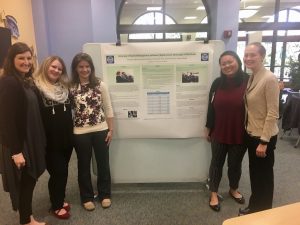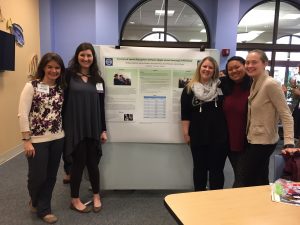Posts tagged AT Symposium
AT Symposium CollaborATe: A Transdisciplinary Approach to Assistive Technology through the Lifespan
 On March 11th, I had the opportunity to attend sessions and present at the poster session during the second annual AT Symposium CollaborATe: A Transdisciplinary Approach to Assistive Technology through the Lifespan at VCU’s Children Hospital of Richmond. While at the conference, I was able to learn more about a variety of assistive devices that can be used to communicate and to complete other daily tasks. The conference included a presentation from a teenage assistive technology (AT) user and her mother. The mother shared many personal stories about the teenagers experiences with AT which included sharing ideas of how to create and construct assistive devices with inexpensive materials. Additionally, I learned about devices that involve low to no technology but are still assistive devices for communication. I met several representatives from various non-profit organizations that allow people in need to trial products and purchase the supplies with a payment plan. Furthermore, I was honored to have our group’s poster selected to be presented at the conference. I met other professionals in the field of speech-language pathology and discussed various aspects of working as a speech-language pathologist. I am thankful to have had the chance to use the CGPS travel grant to attend and present at the AT conference.
On March 11th, I had the opportunity to attend sessions and present at the poster session during the second annual AT Symposium CollaborATe: A Transdisciplinary Approach to Assistive Technology through the Lifespan at VCU’s Children Hospital of Richmond. While at the conference, I was able to learn more about a variety of assistive devices that can be used to communicate and to complete other daily tasks. The conference included a presentation from a teenage assistive technology (AT) user and her mother. The mother shared many personal stories about the teenagers experiences with AT which included sharing ideas of how to create and construct assistive devices with inexpensive materials. Additionally, I learned about devices that involve low to no technology but are still assistive devices for communication. I met several representatives from various non-profit organizations that allow people in need to trial products and purchase the supplies with a payment plan. Furthermore, I was honored to have our group’s poster selected to be presented at the conference. I met other professionals in the field of speech-language pathology and discussed various aspects of working as a speech-language pathologist. I am thankful to have had the chance to use the CGPS travel grant to attend and present at the AT conference.
Assistive Technology Symposium 2017
O n Saturday, March 11, 2017, I attended and presented at the Assistive Technology Symposium called CollaborATe: A Transdisciplinary Approach to Assistive Technology through the Lifespan at Children’s Hospital of Richmond at VCU. As a speech-language pathology student, I focus a lot on assistive technology as augmentative and alternative communication and forget about other types of technology that can help individuals. I liked being able to hear from a teenager who uses several types of assistive technology and from her mother about cheap, effective ways to create assistive technology for her daughter. I also attended a session on GoogleChrome extensions that can be used in the classroom to help those with reading and writing difficulties. This was an interesting perspective because using extensions allows for more flexibility and variety than some of the standard software programs. Finally, I presented a poster, titled Accuracy of Speech Recognition Software (Apple versus Samsung): A Pilot Study, along with four of my peers. This project was conducted during our augmentative and alternative communication course, so it was nice to be able to share our results with professionals.
n Saturday, March 11, 2017, I attended and presented at the Assistive Technology Symposium called CollaborATe: A Transdisciplinary Approach to Assistive Technology through the Lifespan at Children’s Hospital of Richmond at VCU. As a speech-language pathology student, I focus a lot on assistive technology as augmentative and alternative communication and forget about other types of technology that can help individuals. I liked being able to hear from a teenager who uses several types of assistive technology and from her mother about cheap, effective ways to create assistive technology for her daughter. I also attended a session on GoogleChrome extensions that can be used in the classroom to help those with reading and writing difficulties. This was an interesting perspective because using extensions allows for more flexibility and variety than some of the standard software programs. Finally, I presented a poster, titled Accuracy of Speech Recognition Software (Apple versus Samsung): A Pilot Study, along with four of my peers. This project was conducted during our augmentative and alternative communication course, so it was nice to be able to share our results with professionals.